|

Any Questions?
Bernstein's 'Candide'
at English National Opera,
enjoyed by DAVID WILKINS
It's tremendous to be able to welcome Robert Carsen's production of Bernstein's masterpiece to London [English National Opera, 25 June 2008]. Much fun will, I can hardly doubt, be had with punning critiques on whether this might be 'the best of all possible ...' whatevers. Sub-editors can rarely avoid the blindingly-obvious. The more important thing that one shouldn't avoid is the sheer magic of this score. It really is the best of Bernstein (his genius of pastiche, his mastery of all the music he surveyed) and can only be usefully measured against West Side Story (Lenny the innovator). They more-or-less shared composition time -- these rather different works. They even had a transfer-period of musical ideas between them. No sensible person would want to be without either but, in response to the legendary Desert Island Discs question, I'd want to rescue Candide -- the acknowledged perennial problem-child -- before West Side Story -- the difficult but fully-understood adolescent -- when those waves come crashing.
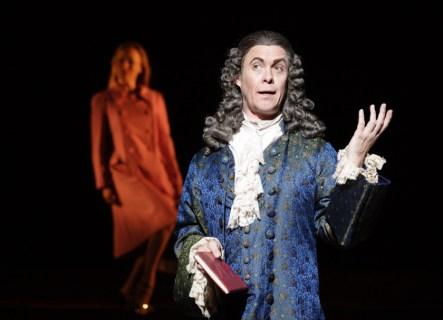
Alex Jennings as Candide's creator Voltaire. Photo © 2008 Catherine Ashmore
|
I've always associated Voltaire's incendiary novella with that massive, but imaginary, putative tome of Oscar Wilde's Miss Prism in The Importance of Being Earnest. There is the same middle-finger insult to literature and life when she explains: 'The good ended happily, and the bad unhappily. That is what Fiction means..' Robert Carsen does seem to approach the chaos and absurdity of the Bernstein / Lillian Hellman take on Voltaire through a similar device that throws its lights and insights in all manner of directions.
This production is, unashamedly, rooted in something which should not be, blithely, thought of as anti-Americanism; it's questioning-Americanism. The end result might be the same but it requires the audience to reach the director's conclusions and, even without doing so, they are going to have a massive load of fun along the way. You can so easily laugh -- as the music alone must invite you to do -- as a film of 1960s consumerism accompanies that startling Overture to this piece. It's amongst the finest four minutes of Bernstein since it offers so much -- and that's exactly what the film does too : 'my dear -- the wealth, the opportunity, the lovely happy families, so fresh of face, so full of fun and their inexhaustible appliances!' It was like reaching for an Argos catalogue! Who wouldn't think that a Panglossian, 'best of all possible worlds' ...? But -- of course (Channel crossing for a moment ...) Blake's 'invisible worm' is ready to reveal itself in the Kennedy assassinations, racism and sundry persecution, and the road to our current wars and despoilation of the planet.
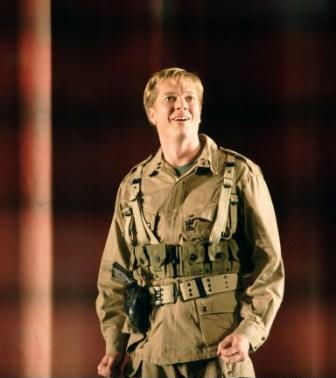
Toby Spence, an adorably naive Candide. Photo © 2008 Catherine Ashmore
|
There are some elements of the thinking behind the production that deservedly raise the shadow of predictability. I think that Carsen himself admitted in an interview that he recognised his Westphalia = West Failure to be a somewhat as Kansas is in August trope -- but thought it relevant, nonetheless. The association of the Auto-da-fe scene with the American 'reds-under-the bed' time is true to Bernstein and Hellman's purpose but, ignoring their lightness and left-field suggestion, evades their intent. The whole of the Las Vegas scenario is too long against a rather obvious 'dollars make the world go around' and there is a real issue here because, when the production seems to have run out of ideas, some great musical numbers lose their impact.
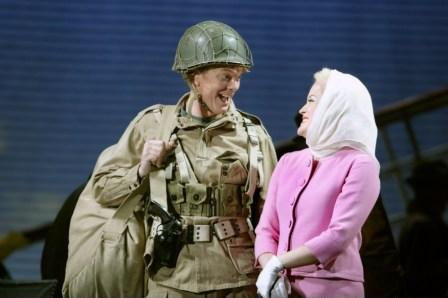
Candide and Cunegonde (Anna Christy) part. Photo © 2008 Catherine Ashmore
|
But so much is fantastic fun! The dancing -- choreographed by Rob Ashford -- is just so right in inspiration and inspiring in execution. Michael Levine's set designs give us an easy handle on the fast-moving geography of the piece. Rumon Gamba (conducting) has something to say about the musical values of the work and seemed to find a happy medium between a Broadway sound and the rather over-Mahlerian efforts of the LSO in Lenny's final recording of the work. He doesn't yet -- how could he? -- have that shoulder-shrugging, the 'smile-does-it-all' magic of the composer but he knows and loves this piece.
Anna Christy is a delicious Cunegonde -- bashful and brazen as required. Much more brazen, of course. Her highlight number, Glitter and Be Gay, might have sacrificed a few musical values to her characterisation as Monroe at that point but she certainly enjoyed the vocal challenges and I was happy to clap and cheer with the rest.
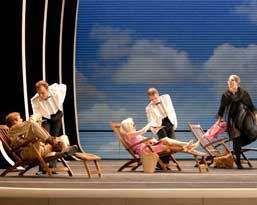
On the beach (Paris Chatelet co-production)
|
Beverly Klein as 'The Old Lady' -- what can I say? It's a peach of a part (cliché 1) and it's guaranteed to invite an ovation (cliché 2) : Well: she captivated the audience from her first entrance and -- no cliché at all -- she deserved all the laughs and audience support she got. I'm ready to donate her a buttock in my will! Not sure, though, what the NHS might make of that?
Toby Spence as Candide engages the audience with vocal certainty and a sure sense of personality. His is a tremendously difficult role to make credible in such an incredible world. He does it well and more than well. There's a lack of soft-voiced singing (the amplification might be an ongoing process for this production) and he's never as emotionally draining as dear Jerry Hadley (who we all need to mourn) in the part. What Lenny described as his 'Puccini Moment' -- the disillusionment of Nothing More Than This -- is moving but not, really, heart-rending. That may be an outcome of such a successfully satirical production. Once we are encouraged to question all values and all people, even the most sincere-seeming might not get the emotional attention it deserves. And the same applies to the Make Our Garden Grow finale : its music will always be heart-string-tugging but, if you've undergone a successful Brechtian alienation, of what value might your tears or cheers be?
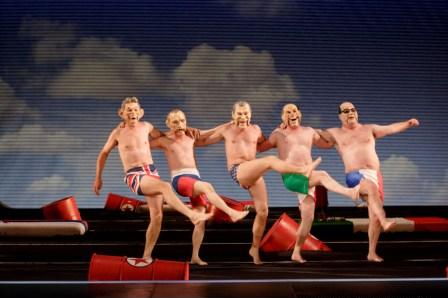
A quintet of unexpected interlopers in English National Opera's summer 2008 production of Leonard Bernstein's 'Candide'. Photo © 2008 Catherine Ashmore
|
As to Alex Jennings as Voltaire / Pangloss / Martin -- he is, in every manifestation, beyond criticism. That's not the same as saying that he's beyond fault. But, if we are requested to learn anything from this piece, therein is the wisdom.

Candide ponders his past and future. Photo © 2008 Catherine Ashmore
|
Lambert Wilson was stunning in the Paris Chatelet production in 2006 (I see, by the way, that the Maximilian role in the States has changed his garb from Catholic canonical to New Right / New Righteousness lounge-suits in this production! What a difference two years makes!).
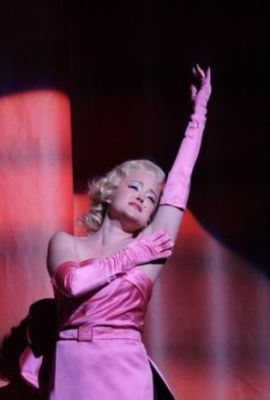
Cunegonde (Anna Christy) in English National Opera's 'Candide'. Photo © 2008 Catherine Ashmore
|
Alex Jennings sings and speaks, taunts and teases and, constantly, engages the audience with, as required, grand gestures or a barely perceptible smirk or wink. We loved him. We loved Bernstein's music. Will we learn our lesson?
'Any Questions?'
Copyright © 31 August 2008
David Wilkins, Eastbourne UK

|

